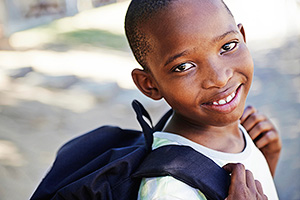Quick Tips: Using Backpacks Safely
Get started
Backpacks are handy for carrying books—and lots of other things. But if they’re not used right, they can strain muscles and even cause back pain.
Backpack safety is important for everyone. It’s especially important for children, who can be hurt by regularly carrying too much weight or by not wearing their backpacks safely.

Choose the right backpack
Look for these features:
- Light weight. Leather backpacks may look nice, but other materials, like canvas or nylon, weigh less.
- Wide, padded shoulder straps. A loaded pack will dig into shoulders if the straps are too skinny.
- Waist belt. This is an important feature. It takes some weight off of the back and transfers it to the hips.
- Handy compartments, the more the better. They help distribute the weight evenly. They also make packs easier to organize.
- Padded back. This keeps sharp edges from digging into the back.
- Wheels. These are nice if you or your child needs to carry a lot. But check with your child’s school to make sure they’re allowed. Remember that these packs will still have to be carried up stairs. And they can get messy when pulled through mud or snow.
Pack it safely
- Experts say a child shouldn’t carry more than 15% to 20% of his or her weight. Don’t guess—use your bathroom scale to weigh the loaded pack.
- Pack the heaviest items closest to the back. Packs with compartments make this easier to do.
- Talk to your child about using his or her locker to keep from carrying everything around all day.
Lift it safely
- Never bend down from the waist to pick up or set down a heavy pack.
- Always squat down, bending at the knee and keeping your back straight.
- If you need to, you can put one knee on the floor and the other knee in front of you while you lift the pack and swing it around to your back.
Wear it safely
- Pack wearers should use both shoulder straps. It may seem easier or more comfortable to sling the pack over just one shoulder, but that’s a bad habit that can lead to back or shoulder pain.
- Always use the waist belt and tighten all the straps so the pack fits snugly.
- Make sure your child stands up straight while wearing a backpack. If he or she must lean forward, the pack is too heavy.
- If your child is having back pain or neck soreness, talk to your doctor. Encourage your children to tell you about any pain or soreness.
Extra tips for hikers
Hikers can carry a lot more weight in their packs. But it’s still important to follow some safety tips:
- In the weeks before a big hike, use stretching and strengthening exercises to get your muscles in shape, especially your trunk.
- Stand up straight while wearing your pack. It may seem easier to lean forward because you don’t have to use your muscles as much. But it’s bad for your back, because you’re making your spine do all the work.
- Learn several ways to lift a heavy backpack. For example:
- Face the back of your pack, with its shoulder straps facing you. With your knees slightly bent and one leg forward, slide the pack up to your thigh. Put one arm through its shoulder strap and swing the pack onto your back.
- Have a friend hold the pack for you while you insert your arms into the straps.
References
Other Works Consulted
- American Academy of Orthopedic Surgeons (2011). Backpack safety. Available online: http://orthoinfo.aaos.org/topic.cfm?topic=a00043.
- American Academy of Pediatrics (2011). Backpack safety. Healthy Children. Available online: http://www.healthychildren.org/english/safety-prevention/at-play/Pages/Backpack-Safety.aspx.
Current as of: June 26, 2019
Author: Healthwise Staff
Medical Review:William H. Blahd, Jr., MD, FACEP – Emergency Medicine & Martin J. Gabica, MD – Family Medicine & Adam Husney, MD – Family Medicine & Kathleen Romito, MD – Family Medicine & Robert B. Keller, MD – Orthopedics
Topic Contents
This information does not replace the advice of a doctor. Healthwise, Incorporated, disclaims any warranty or liability for your use of this information. Your use of this information means that you agree to the Terms of Use. Learn how we develop our content.

